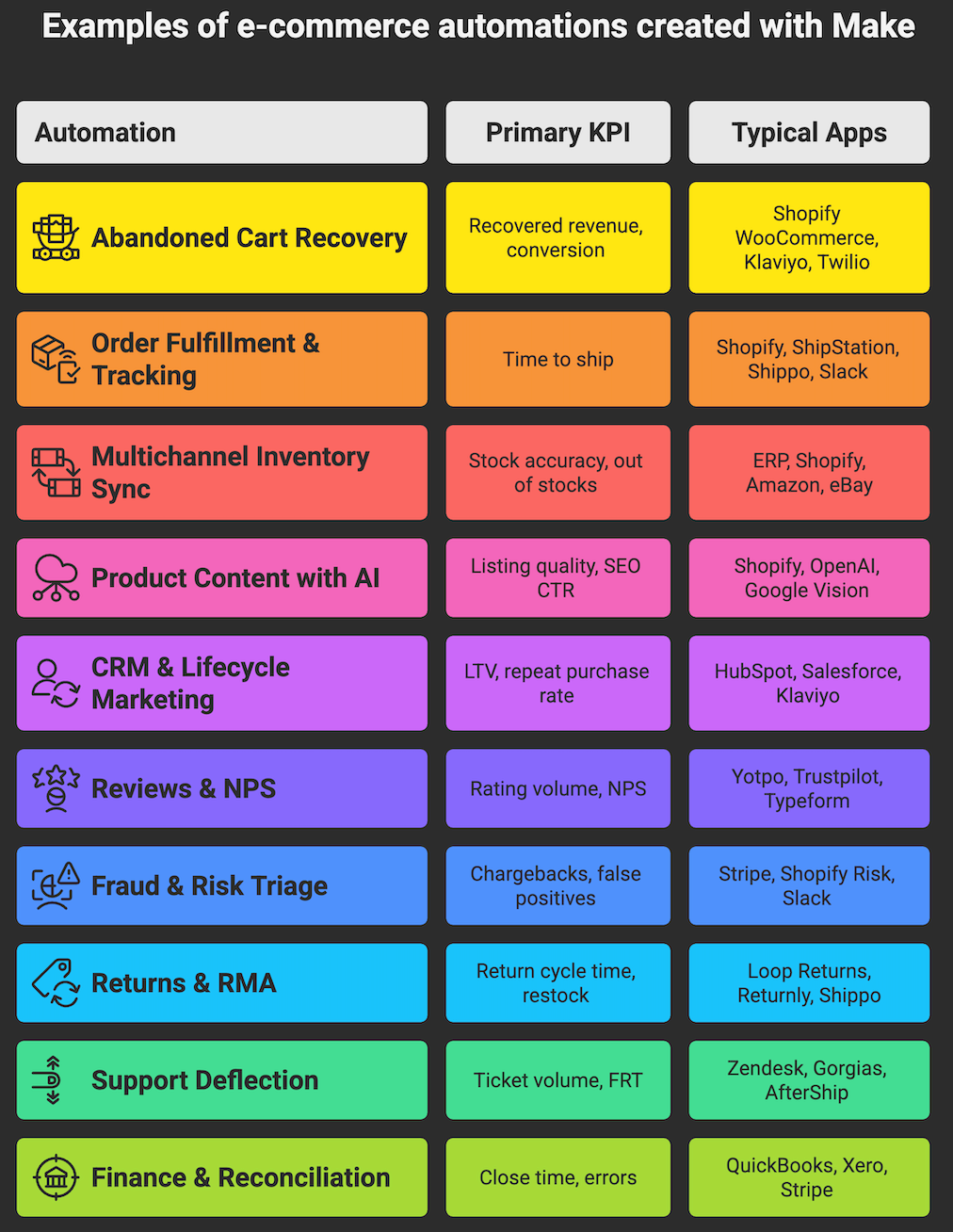Here is a practical playbook for how to automate your ecommerce business. You will learn what ecommerce automation is, where it delivers measurable ROI, and how to implement ten high impact workflows in Make without rebuilding your stack. Every use case includes the steps to configure it, the apps involved, and the business outcomes you should expect.
Whether you run Shopify, WooCommerce, BigCommerce, or a custom storefront, you can orchestrate “order to cash”, customer communications, and operations using Make. We will focus on fast wins, governance tips, and how to keep humans in the loop where it matters.
WHAT IS E-COMMERCE AUTOMATION?
Ecommerce automation is the use of event driven workflows to execute online retail processes with minimal human input across marketing, order management, fulfillment, service, and finance. In practice, it connects your store, apps, and data so triggers like “order created” or “shipment delivered” automatically run actions such as updating inventory, emailing customers, or reconciling payments. This aligns with Gartner’s broader view of hyperautomation, which combines multiple tools to rapidly identify, vet, and automate business processes at scale.
BENEFITS OF E-COMMERCE AUTOMATION
Done right, automation removes manual work, reduces errors, and unlocks growth. The gains are not theoretical. They show up in faster cycle times, higher conversion, lower support volume, and cleaner books.
- Revenue lift. Recover abandoned carts and personalize messages based on behavior. Leaders in personalization drive materially more revenue than peers.
- Cost and time savings. Replace repetitive tasks like copy paste, CSV imports, and status emails with workflows that run 24 by 7. Your team focuses on exceptions and high value conversations.
- Fewer errors. Eliminate manual rekeying between store, 3PL, CRM, and accounting. That means cleaner data, fewer stockouts, and more accurate payouts.
- Better customer experience. Proactive post purchase updates reduce “where is my order” tickets and increase trust. Shoppers expect clear communication after they buy.
- Scalability. Absorb demand spikes or seasonal peaks with the same headcount. Add new channels or apps without rewiring everything.
- Control and compliance. Standardize processes, add approvals for risky actions, and keep an audit trail. Make supports routers, filters, and error handlers to build robust flows. Make error handling
- Faster decision making. Sync operational data into a single source of truth for finance and operations, then visualize it in Looker Studio or your BI tool.

E-COMMERCE AUTOMATIONS YOU CAN SET UP WITH MAKE
Below are ten automations that generate measurable results fast. Each one notes what it does, a concise Make build guide, typical apps, a scenario, and key benefits. If you are new to Make automation, remember that scenarios are built from triggers, modules, routers, and filters, with webhooks to receive events. Make webhooks and routers and filters are foundational.
1) Abandoned cart recovery with personalized email and SMS
Fastest revenue win. Cart abandonment averages about 70 percent, so targeted reminders recover material revenue.
What it does and why it is useful: Detects shoppers who start checkout but do not complete. Sends timely, personalized nudges via email and SMS, then stops automatically if they buy.
How to build it in Make:
- Create a scenario. Add Shopify Watch Abandoned Checkouts or WooCommerce Watch Carts. Shopify on Make and WooCommerce on Make
- Add a filter to exclude customers who completed a purchase in the last X hours.
- Enrich with customer and cart details. Use Iterator to format line items.
- Add a Router. Branch 1 sends email via Klaviyo or Mailchimp with cart items embedded. Branch 2 sends SMS via Twilio if the customer opted in. Klaviyo and Twilio
- Insert a Delay for 20 to 60 minutes. Add a conditional second reminder 24 hours later if no order exists. Use a Shopify Search Orders module before sending.
- Log outcomes to Google Sheets or Airtable for reporting.
- Add an Error handler to catch invalid phone or email and skip gracefully.
Apps used: Shopify or WooCommerce, Klaviyo or Mailchimp, Twilio, Google Sheets or Airtable.
Scenario: A DTC apparel brand triggers an email 30 minutes after abandonment with the exact items and a free shipping incentive for first time buyers. A second attempt via SMS runs 24 hours later if there was no conversion.
- Key benefits: Recovered revenue. Automated follow up. Channel mix based on consent. Unified reporting.
2) Order to fulfillment and proactive tracking alerts
From paid to packed without manual touches. Proactive notifications reduce “where is my order” questions and set clear expectations.
What it does and why it is useful: When an order is paid, it creates shipments, generates labels, updates tracking, and alerts the customer automatically.
How to build it in Make:
- Add Shopify Watch Orders, filter status equals paid.
- Check order risk score. If high, route to manual review in Slack. If low, proceed.
- Create a shipment in ShipStation or Shippo. Store the label and tracking number.
- Update Shopify fulfillment with tracking data.
- Send the customer an email and optional SMS with tracking and a branded link. Use Klaviyo and Twilio.
- Schedule a follow up when status equals delivered to request a review, then stop if a support ticket was opened.
Apps used: Shopify, ShipStation or Shippo, Klaviyo or Mailchimp, Twilio, Slack.
Scenario: A lifestyle brand ships 500 orders daily. Labels and tracking sync automatically. Customers get a branded tracking link within minutes of purchase, and a delivery confirmation later.
- Key benefits: Faster pick pack. Fewer WISMO tickets. Happier customers. Clean tracking data across systems.
3) Multichannel inventory sync across store, marketplace, and ERP
One source of truth for stock. Overselling hurts CSAT and margins. This workflow keeps quantities aligned everywhere.
What it does and why it is useful: Centralizes inventory from ERP or WMS and updates all channels so product availability stays accurate, even during spikes.
How to build it in Make:
- Decide the system of record for inventory, for example NetSuite or Odoo. Pull current stock by SKU on a schedule.
- Normalize SKUs across channels using a mapping table in Airtable or a Make Data Store.
- Use Routers to push quantity updates to Shopify, WooCommerce, and marketplaces. Include safety buffers for high velocity SKUs.
- On every order paid event, decrement inventory immediately and broadcast to other channels to prevent oversell.
- Log deltas and exceptions to a Google Sheet and alert ops in Slack when thresholds are breached.
Apps used: ERP such as NetSuite or Odoo via REST, Shopify, WooCommerce, Amazon SP API, eBay API, Airtable, Slack.
Scenario: A home goods seller lists 2,000 SKUs on Shopify, Amazon, and eBay. Make syncs ERP stock to all three every 5 minutes and on each order event.
- Key benefits: Stock accuracy. Fewer cancellations. Lower safety stock. Channel harmony without a heavy PIM.
4) Product content and SEO enrichment with AI
Better listings, faster. Strong titles, descriptions, and alt text improve click through and accessibility.
What it does and why it is useful: Generates on brand product copy, meta tags, and image alt text at scale. Reduces time to publish and keeps content consistent.
How to build it in Make:
- Trigger on new or updated product in Shopify.
- Call OpenAI with a product brief and style guide prompt to produce title, bullets, and meta description.
- Optionally, run images through Google Vision to suggest attributes and generate descriptive alt text.
- Write enriched content back to Shopify fields. Store original and AI versions for review.
- Add an approval step in Slack or email for products over a certain price or category.
Apps used: Shopify, OpenAI, Google Cloud Vision, Slack or Gmail, Airtable for content QA.
Scenario: A cosmetics brand launches 50 new SKUs monthly. The workflow drafts compliant, on brand copy in seconds, then a merchandiser approves in Slack before publishing.
- Key benefits: Faster merchandising. Consistent tone. Improved SEO hygiene. Accessible images with alt text.
5) Customer lifecycle and CRM sync for segmentation
Right message, right time. Personalized lifecycle campaigns drive more revenue and loyalty.
What it does and why it is useful: Captures key events, enriches profiles, and moves customers into the right CRM segments and email flows automatically.
How to build it in Make:
- Use webhooks or Watch Events to collect sign ups, first purchase, repeat purchase, churn risk, and high value thresholds.
- Upsert contacts in HubSpot or Salesforce. Map custom properties like last product bought, AOV, and consent flags.
- Add to Klaviyo lists or segments. Trigger flows for onboarding, winback, or VIP perks.
- Mirror segments into ad platforms for lookalike audiences via Facebook or Google Ads connectors.
- Write a daily snapshot to a warehouse or Google Sheet for monitoring.
Apps used: Shopify, HubSpot or Salesforce, Klaviyo, Facebook Ads, Google Ads, Google Sheets.
Scenario: A subscription coffee brand detects churn risk at day 25 without reorder and triggers a discount email plus a reminder SMS to VIPs only.
- Key benefits: Higher LTV. Lower churn. Consistent consent and profile data across tools.
6) Post purchase reviews and NPS capture
Proof and insight at scale. Reviews increase conversion and NPS surfaces friction you can fix.
What it does and why it is useful: Requests reviews and NPS only after delivery. Routes detractors to service, celebrates promoters in marketing.
How to build it in Make:
- On fulfillment update or carrier delivered status, Delay 3 to 7 days depending on product type.
- Send a review request via Yotpo or Trustpilot, including the purchased items.
- Send an NPS survey via Typeform. Capture score and verbatim response via webhook in Make.
- If NPS less than 7, create a Zendesk ticket and notify a Slack channel. If 9 or 10, add the customer to a UGC outreach list.
- Aggregate review rates and NPS trend to a dashboard.
Apps used: Shopify, Yotpo or Trustpilot, Typeform, Zendesk or Gorgias, Slack, Google Sheets.
Scenario: An electronics retailer waits 10 days after delivery for setup time, then requests a review and NPS. Detractors receive priority support outreach within two hours.
- Key benefits: More social proof. Faster issue recovery. Continuous feedback loop to product and ops.
7) Fraud and order risk triage with human in the loop
Protect revenue without blocking good orders. Combine platform risk signals with payment provider intelligence.
What it does and why it is useful: Scores orders, auto holds suspicious ones, and creates a clear review queue for your team.
How to build it in Make:
- On Shopify Order Created, pull Shopify risk assessments.
- Call Stripe Radar for charge level risk insights if Stripe processed the payment.
- Apply business rules, for example AVS mismatch and high order value equals hold.
- Set order tags to On Hold and notify a Slack channel with Approve or Decline buttons via a Slack Block Kit message.
- On approval action, remove the “hold” tag and continue fulfillment. On decline, trigger refund and restock.
- Log decisions to a sheet for later model tuning.
Apps used: Shopify, Stripe, Slack, Google Sheets.
Scenario: A streetwear brand holds orders over 300 dollars with mismatched billing and shipping to reduce chargebacks during drops.
- Key benefits: Fewer chargebacks. Faster review. Clear audit trail. Less friction for good customers.
8) Returns and RMA automation
Turn returns into loyalty. A smooth return experience influences repeat purchase behavior.
What it does and why it is useful: Standardizes returns intake, label generation, restocking, and refunds without manual back and forth.
How to build it in Make:
- Trigger on a Return Request form submission or a returns portal event from Loop or Returnly.
- Validate eligibility based on order age, condition, and policy. If not eligible, notify the customer with alternatives.
- Create an RMA, generate a return label via Shippo, and email it to the customer.
- On warehouse receipt scan, restock item in Shopify and trigger refund or store credit via payment provider.
- Update CRM and alert service if an exception occurs.
Apps used: Loop Returns or Returnly, Shopify, Shippo, Stripe or PayPal, Gmail or Klaviyo.
Scenario: A footwear brand offers instant store credit upon label creation while refunding to the card after inspection. All system updates and emails run automatically.
- Key benefits: Lower handling time. Accurate inventory. Fewer emails. Transparent policy enforcement.
9) Support ticket deflection and instant order status
Resolve before a human reads it. The best support answers the question instantly with context. Automation and self service are common traits of high performing service teams.
What it does and why it is useful: On incoming tickets, fetch order details and send a personalized status update or macro automatically, reducing first response time and volume.
How to build it in Make:
- Trigger on new ticket in Zendesk or Gorgias.
- Look up the customer by email in Shopify. Fetch recent order and tracking number.
- Query shipment status from AfterShip or 17Track.
- If status equals in transit or delivered, post a public reply with date and tracking link. If there is no order found, route to the agent.
- Tag the ticket with automation outcome and update CSAT dashboard.
Apps used: Zendesk or Gorgias, Shopify, AfterShip or 17Track, Slack for escalations.
Scenario: A beauty brand deflects 40 percent of WISMO tickets with instant status replies that include the latest scan event and delivery ETA.
- Key benefits: Lower ticket volume. Faster first response. Happier agents. Consistent answers.
10) Finance and reconciliation for clean books
Close the month without spreadsheets. Automate the flow of orders, fees, taxes, and payouts into accounting and BI.
What it does and why it is useful: Creates invoices, posts payments, reconciles gateway payouts, and prepares tax summaries.
How to build it in Make:
- On order paid, create a sales receipt or invoice in QuickBooks or Xero with line items, discounts, shipping, and tax.
- On daily Stripe payout, reconcile orders, fees, and disputes to the bank deposit. Flag mismatches for review.
- Pull sales tax by jurisdiction from TaxJar or Avalara for filing.
- Write transactional data to BigQuery or Google Sheets and visualize in Looker Studio.
- Alert finance in Slack if reconciliation variance exceeds a threshold.
Apps used: QuickBooks or Xero, Stripe and PayPal, TaxJar or Avalara, Google Sheets or BigQuery, Looker Studio.
Scenario: A scaling DTC brand posts hundreds of daily orders to QuickBooks with the correct chart of accounts and reconciles Stripe payouts every morning, reducing month end crunch.
- Key benefits: Accurate books. Faster close. Clear tax position. Single source of truth for revenue KPIs.

CHOOSE MAKEITFUTURE AS YOUR AUTOMATION PARTNER
Automation is a system, not a single script. Start with one or two high value flows, validate the ROI, then layer in more. A practical path looks like this: identify a clear business outcome, design and secure a minimal viable workflow, pilot with monitoring and fallbacks, scale and harden with governance, and finally enable your team with documentation and training.
Bottom line. You do not need to change platforms to automate your ecommerce business. With Make, you can connect the stack you already own, standardize processes, and deliver measurable gains across revenue, cost, and customer experience. The ten use cases above are proven, fast to implement, and extensible as you grow.
If you want a partner that blends strategy, engineering, and change management, we can help. Makeitfuture designs, builds, and supports automation programs for SMBs and enterprises. We start with a discovery workshop and ROI model, then implement secure, observable workflows in Make, integrate AI where it really adds value, and train your team to run them. Typical pilots go live in two to four weeks.
- Services: opportunity discovery, solution design, Make implementation, AI assisted content, data engineering, QA and monitoring, documentation, and enablement.
- Tooling expertise: Make, Shopify, WooCommerce, Klaviyo, HubSpot, Salesforce, ShipStation, Stripe, Xero, QuickBooks, and major BI tools.
- Engagement options: fixed scope pilots or ongoing automation ops.
Explore our approach to intelligent automation and see how we can accelerate your roadmap. Visit our services page or contact us to discuss your needs.














.png)
.png)



.avif)
